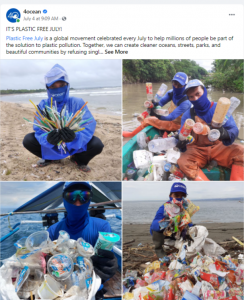Reducing the amount of plastic, debris, ghost netting, chemicals, and toxins that end up in our water systems is essential right now which means cleaning our water must be done on a personal, community, national, and global level to address this critical problem.
If we can do our part on a personal level by not using harsh chemicals for cleaning, we will not only protect ourselves from the toxins, but the water and all that live in it, to which we will turn for a source of drinking water. A small step forward is using vinegar and baking soda over harsh chemicals when cleaning or other alternatives out there for cleaning our homes. Pinterest page on water offers more tips to find inspiration for running your home on a greener basis as well as information on what we are facing on an environmental level. Find hundreds of posts regarding what people are sharing on issues challenges and innovative solutions, including solving the problem of cleaning our water and distributing freshwater on Managing Earth’s Facebook page.
 Visit www.theoceancleanup.com to read up on the details of their solution for capturing large amounts of floating plastic and debris driven by current and removing it to help with cleaning our water.
Visit www.theoceancleanup.com to read up on the details of their solution for capturing large amounts of floating plastic and debris driven by current and removing it to help with cleaning our water.
Bright Vibes Video: Explaining the process of removing plastic from the waters of the world
The ‘Seawer’- The Garbage-Seacraper is designed to rid the water of debris. It garnered Honorable Mention for Sung Jin Cho from South Korea at the 2014 Evolo Skyscraper Competition.
www.facebook.com/927473997320061/videos/
Ocean Confetti, the challenge of micro-plastics by http://thekidshouldseethis.com/
Plastics that are not readily recyclable -#3(pvc), #4(ldpe), #5(pp), #6(ps), #7 (other)
www.reefcheck.org– People monitoring the reefs to help protect them.
www.facebook.com/ScienceNaturePage/videos/
Eco alternatives to putting chemicals down the drain: DIY Craft Zone’s Article – Your Ultimate Guide For Fabric Stain Removal (In One Simple Chart)
Interesting Engineering: Australian City Uses Drainage Nets to Stop Waste from Polluting Waterways
Canada’s Ocean Protection Plan
’10 Things you can do to Save the Ocean’ by National Geographic

We support and applaud the work being done by 4Ocean and hope many more similar groups begin with the people as this one did. Check out the 4ocean Facebook page to see the great work they are doing. and watch their video on Cleaning our Water.
Indiegogo Video: Water Master Dredgers


Seabin Project – For Cleaner Oceans – Video of Divers cleaning up the seafloor
The Pasteurization Technology Group provides unique, patented “2 for 1” disinfection and energy solutions for municipal and industrial wastewater treatment facilities.
Canadian Desalination and Water Treatment Companies:
Fluence Corporation, Bogotá, BC
Filtralite – Leca Norge ASFiltralite, Saskatoon, SK.
Oneka Technologies, Sherbrooke, QC
Natural Seawater Desalination Ltd, Sarnia, ON
Doosan Heavy Industries & Construction Co., Ltd., Distributor in Surrey, BC
Saltworks Technologies, Richmond, BC
Canadian Water Treatment Companies
Fil-Trek Corporation, Red Deer, AB
ModernWater PLC, Burnaby, BC
CarboNet Nanotechnologies, Inc., Vancouver, BC
Tubacex Group, Mississauga, ON
Toronto Water Treatment Technologies
Vahn-Tech International Inc., Calgary, AB

National Geographic: Dead zones are low-oxygen or hypoxic, areas in the world’s oceans and lakes. Because most organisms need oxygen to live, few organisms can survive in hypoxic conditions.
Desalination Plants in Canada:
acciona.ca/projects/water/desalination-plants/
entropie.com/case-studies/sea-water-desalination-plant-canada
yokogawa.com/ca/industries/water-wastewater/desalination/
waterworld.com/-canadian-clear-water-fzc-installs-desalination-plants-in-egypt-iraq-oman







